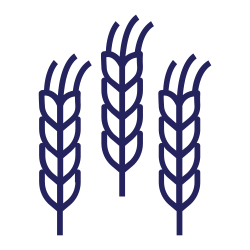« Return to all Research Projects
Section Title
Adapting wheat to arid environments: mining Canadian germplasm for reduced night-time water loss and improved water productivtiy
Crop Types
- Wheat
Summary
Field and greenhouse experiments performed as part of this project and by prior studies have shown that wheat plants respond to drought stress with higher levels of β-diketones and alkanes. Results from the gene expression experiment indicate that the W1 locus plays a key role in β-diketone production and that TaCER1-6 genes may be used to predict alkane levels. These genes may be effective markers for selecting for drought tolerant wheat varieties in the future.
Key Takeaways
- With the impact of climate change, older varieties are not good to grow in adverse conditions. Modern varieties are equipped with adaptive tools (stress avoidance and stress tolerance) that can minimize loss in harsh conditions.
- Wheat Breeding in western Canada has consistently played a critical role in the progress of continuous yield gain and has contributed over half of the total on-farm yield gain in the past several decades. These gains through genetic improvements should be complemented by changes in management practices, such as appropriate fertilizer use, timely weed control, and early planting in the season to utilize available soil moisture.
- Warmer temperatures caused yield loss mainly by shortening the growing season, while elevated VPD increased water loss and triggered several water stress responses. This includes reduced photosynthesis, lowered leaf area development, shortened plant height, etc.
- Breeding for climate-resilient phenotypes (such as specific spectral indices) with desirable characteristics can help to better cope with the changing climate. Adaptation strategies should be systematically examined, and the mechanisms through which they alleviate yield loss should be better understood using high throughput techniques at the farm level.














